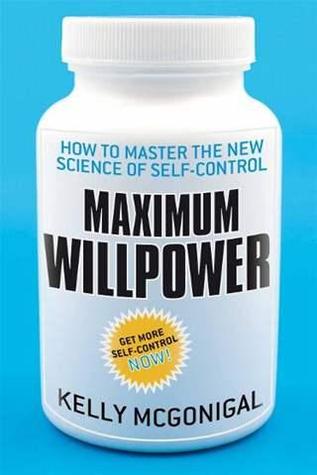More on this book
Community
Kindle Notes & Highlights
Read between
January 24 - February 3, 2020
TO SUCCEED AT SELF-CONTROL, YOU NEED TO KNOW HOW YOU FAIL
Research shows that people who think they have the most willpower are actually the most likely to lose control when tempted.
One thing the science of willpower makes clear is that everyone struggles in some way with temptation, addiction, distraction and procrastination. These are not individual weaknesses that reveal our personal inadequacies – they are universal experiences and part of the human condition.
theories are nice, data is better.
Willpower is about harnessing the three powers of I will, I won’t and I want to help you achieve your goals (and stay out of trouble).
Self-control is a better predictor of academic success than intelligence
Many temporary states – like being drunk, sleep-deprived or even just distracted – inhibit the prefrontal cortex, mimicking the brain damage that Gage sustained.
Some neuroscientists go so far as to say that we have one brain but two minds
without desires we’d become depressed, and without fear we’d fail to protect ourselves from future danger.
Dolphins and elephants can recognize themselves in a mirror,
Without self-awareness, the self-control system would be useless.
You need to recognize when you’re making a choice that requires willpower; otherwise, the brain always defaults to what is easiest.
Most of the time, we don’t even realize we’re making a choice.
How can you control yourself if you aren’t even aware that there is something to control?
When your mind is preoccupied, your impulses – not your long-term goals – will guide your choices.
To have more self-control, you first need to develop more self-awareness. A good first step is to notice when you are making choices related to your willpower challenge.
neuroscientists have discovered that, like an eager student, the brain is remarkably responsive to experience. Ask your brain to do maths every day, and it gets better at maths. Ask your brain to worry, and it gets better at worrying.
Neuroscientists have discovered that when you ask the brain to meditate, it gets better not just at meditating, but also at a wide range of self-control skills, including attention, focus, stress management, impulse control and self-awareness.
One study found that just three hours of meditation practice led to improved attention and self-control. After eleven hours, researchers could see those changes in the brain.
A short practice that you do every day is better than a long practice you keep putting off to tomorrow.
BEING BAD AT MEDITATION IS GOOD FOR SELF-CONTROL
the fight-or-flight response wants to make you more impulsive.
heart rate variability – a measurement most people have never heard of, but one that provides an amazing window into the body’s state of stress or calm.
when people successfully exert self-control, the parasympathetic nervous system steps in to calm stress and control impulsive action. Heart rate goes down, but variability goes up.
Studies also show that people with higher heart rate variability are better at ignoring distractions, delaying gratification and dealing with stressful situations.
Anxiety, anger, depression and loneliness are all associated with lower heart rate variability and less self-control.
The focus meditation you learned in the last chapter is one of the easiest and most effective ways to improve the biological basis of willpower. It not only trains the brain, but also increases heart rate variability.
The willpower miracle was physical exercise.
Exercise turns out to be the closest thing to a wonder drug that self-control scientists have discovered.
The long-term effects of exercise are even more impressive. It not only relieves ordinary, everyday stress, but it’s as powerful an antidepressant as Prozac.
A 2010 analysis of ten different studies found that the biggest mood-boosting, stress-busting effects came from five-minute doses of exercise, not hour-long sessions.
It hardly ever occurs to us that we don’t need to become better people, but to become better rested.
Shortchange your sleep, and you wake up with temporary Phineas Gage–like damage to your brain.
If you know you could use more sleep but you find yourself staying up late anyway, consider what you are saying “yes” to instead of sleep.
Science also points us to a critical insight: stress is the enemy of willpower.
Stress encourages you to focus on immediate, short-term goals and outcomes, but self-control requires keeping the big picture in mind.
Learning how to better manage your stress is one of the most important things you can do to improve your willpower.
Researchers have found that self-control is highest in the morning and steadily deteriorates over the course of the day.
if you try to control or change too many things at once, you may exhaust yourself completely.
It was as if every act of willpower was drawing from the same source of strength, leaving people weaker with each successful act of self-control.
And because every act of willpower depletes willpower, using self-control can lead to losing control.
willpower rule: If you never seem to have the time and energy for your “I will” challenge, schedule it for when you have the most strength.
Amazingly, boosting blood sugar restored willpower.
the brain treats energy like money. It will spend energy when resources are high, but save energy when resources are dropping.
Importantly, it wasn’t the absolute level of blood sugar that predicted a participant’s choices – it was the direction of change. The brain asked, “Is available energy increasing or decreasing?”
Other studies have found that committing to any small, consistent act of self-control – improving your posture, squeezing a handgrip every day until your hand is exhausted, cutting back on sweets, and keeping track of your spending – can increase overall willpower.
Through each of these willpower exercises, the brain gets used to pausing before acting. The triviality of the assignments may even help this process.


